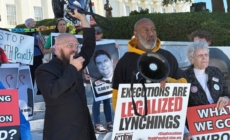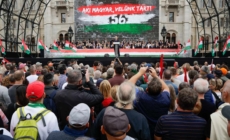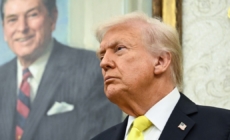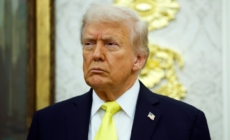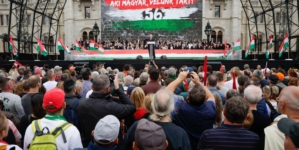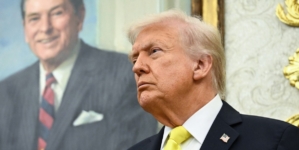-
Missouri Sports Betting 2025: Launch Updates & Sportsbooks - 41 mins ago
-
Anthony Todd Boyd’s Final Words Before Alabama Execution - 47 mins ago
-
FOX Super 6 contest: MLB World Series Picks - about 1 hour ago
-
Dog Owner Suspicious After Window Blinds Fall—Then Checks Security Camera - about 1 hour ago
-
Orbán: Brussels today is not a source of help, but a source of danger - 2 hours ago
-
Trump terminates Canada trade talks again after Ontario runs ad featuring Reagan - 2 hours ago
-
Alaska Airlines grounds flights across the nation due to IT outage - 2 hours ago
-
Donald Trump Says He’s Terminating Canada Trade Negotiations - 2 hours ago
-
4 Takeaways From the Chargers’ Win Over the Vikings on Thursday Night - 2 hours ago
-
Jobs and economic struggles of Californians light up central to clash between candidates for governor - 3 hours ago
Russia Issues New Nuclear Warning as NATO Tensions Flare
Russia believes some NATO members, in particular Poland, want to abandon restrictions on the deployment of nuclear weapons in their countries, which would aggravate “strategic risks” and tensions, Russian foreign ministry spokeswoman Maria Zakharova said.
Newsweek contacted NATO and the Polish foreign ministry for comment via email outside office hours.
Why It Matters
Zakharova’s comments highlight Russia’s concerns about NATO amid heightened tensions over Ukraine and the collapse of arms control frameworks like the INF Treaty, raising fears of a renewed arms race and strategic miscalculation.
What To Know
Zakharova said Polish officials had appealed to the United States “in an attempt to lure Washington into a venture regarding the deployment of US nuclear weapons on Polish territory.”
“By resorting to such moves, formally non-nuclear NATO members once again demonstrate their defiant disregard for the Treaty on the Non-Proliferation of Nuclear Weapons,” she told a briefing, as reported by Russian state-owned news agency TASS.
“It should not be excluded that some of them, which are still observing national restrictions regarding the deployment of nuclear weapons on their territories, may completely abandon them (obligation) in the future,” she said.
Zakharova also said that this month’s annual NATO nuclear deterrence exercise, “Steadfast Noon,” which involves 14 alliance members and up to 60 aircraft, was “deeply destabilizing.”
She said that “this scheme and the corresponding capabilities of the NATO countries” would lead to “further aggravation of strategic risks and increased tensions.”
Russian Deputy Foreign Minister Sergei Ryabkov warned on Wednesday that “the hostile policy of NATO countries” could “lead to a head-on clash between nuclear powers.”
This week, Trump postponed a planned meeting with Russian President Vladimir Putin in Budapest to discuss the war in Ukraine and Putin oversaw a major nuclear exercise involving intercontinental ballistic missiles, strategic bombers and submarine-launched ballistic missiles.
What People Are Saying
NATO Secretary-General Mark Rutte, ahead of this month’s exercise: “We need to do this because it helps us to make sure that our nuclear deterrent remains as credible, and as safe, and as secure, and as effective as possible. It also sends a clear signal to any potential adversary that we will and can protect and defend all allies against all threats.”
Ryabkov, during a webinar hosted by the Center for Energy and Security Studies: “Among the relevant negative factors, we highlight the hostile policy of NATO countries, which can lead to a head-on clash between nuclear powers, as well as the development by this self-proclaimed nuclear alliance of schemes and means of the so-called joint nuclear missions, including the expansion of the geography of the U.S. nuclear presence in Europe and the circle of countries to which the delivery of American special munitions to targets is delegated.”
What Happens Next
Russia has signaled a potential withdrawal from remaining arms control treaties and NATO is intensifying its deterrence posture. Trump has expressed frustration with Putin’s refusal to move on his conditions for a settlement of the war in Ukraine.
Source link

